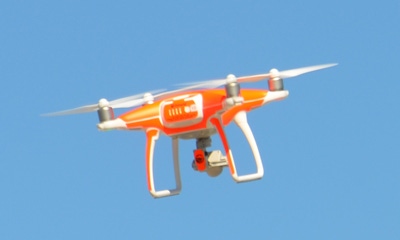
A farmer who doesn’t have an unmanned aerial vehicle yet but who intends to buy one soon saw information about the new licensing procedure available through rules established by the Federal Aviation Administration. They are spelled out in a document called Part 107. The farmer’s goal was to obtain his operator's certificate now, before buying a UAV.

TIME FOR LICENSE: Now that the Federal Aviation Administration has issued new rules for using drones in agriculture, questions about what it takes to obtain a license have come to the forefront.
That prompted a series of questions, beginning with how to start the process of obtaining a certificate. If you already have a drone or plan to buy one to scout crops, you may have the same questions. Chad Colby, general manager of Central Illinois Ag, a Case IH dealer, is a self-taught expert on UAVs and UAV rules. He helps explain the certification process as he understands it today. He anticipates that changes in technology could prompt changes to the rules in the future.
If you’re interested in pursuing a UAV operator’s certificate, here is how you can start.
1. Check out the FAA website and review Part 107. To see the actual rules, visit faa.gov/uas/media/rin_2120-aj60_clean_signed.pdf. The document explains the difference between registering your UAV and marking it with numbers, and obtaining an operator’s certificate. If you are going to fly a drone for commercial purposes, which includes using scouting information from your own fields to make decisions, you need to both register your drone and obtain the certificate.
Be wary of sites offering to help you register a drone for a fee, or of sites providing training to take the UAV knowledge test at a large price, Colby notes. Read the fine print on any website. Even if it starts out "FAA drone registration help," it may be a commercial site not affiliated with the FAA.
2. Begin the process of obtaining a certificate. Colby recommends starting at knowbeforeyoufly.org. This site provides a wealth of knowledge that will not only aid in passing the knowledge test, but also help you operate your UAV properly.
3. Check out another helpful link. You can increase your knowledge at faa.gov/uas/getting_started/fly_for_work_business/becoming_a_pilot/#first.
4. Obtain study materials. Colby says a great site to learn more is asa2fly.com/Test-Prep-remote-Pilot-P3573.aspx. You can order a book at this site for $20. “If you read and study the book, you should know everything you will need to know to pass the test and obtain your certificate,” he says.
5. Find a testing facility. There are designated testing centers where you take the exam, Colby says. The exam is not online. Find a testing center at faa.gov/training_testing/testing/media/test_centers.pdf. The cost for the test is about $150. You can retake it if you fail the first time. Once you obtain your certificate, you must pass a recurrent knowledge test every two years, Colby adds.
About the Author(s)
You May Also Like




